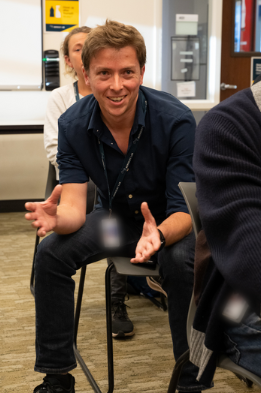The Biosciences Area encourages researchers to engage with companies to seek informal or formal collaborations, proposal partners, exchange of materials, or simply to learn more about the needs of industry sectors to which their research may be applicable. The Biosciences Technology Commercialization Associate, Jeremy Greeter, and the JBEI Director of Commercialization, Robin Johnston, are constantly working to develop these relationships and will be happy to help facilitate meetings with companies of interest.
When and how to request a non-disclosure agreement (NDA)
Initial conversations with companies often do not require NDAs because they stay at a high level, with little detail shared by either party. However, when you reach the point where you want to discuss ideas that have not been published, or are not covered in a patent or patent application, or the company would like to share information that they do not want made public, you will need to have a non-disclosure agreement in place. An NDA prohibits the signing parties from sharing confidential information with other parties for a limited period of time (often five years), and prevents disclosures of inventions or new ideas from being considered “public disclosures,” thereby forfeiting patent rights.
NDAs are managed, negotiated, and signed by IPO; researchers and scientific managers do not sign NDAs. NDAs can take several months to execute depending on company response time and requests for modifications, as well as the number of requests in the IPO queue.
When and how to request a Material Transfer Agreement (MTA)
Whenever you want to transfer materials to academic institutions (including any University of California campus), government laboratory (even a DOE lab), nonprofit organization, or company, you will need to request a Material Transfer Agreement (MTA). Not having an MTA in place puts your research and Berkeley Lab at risk. The MTA diligence process ensures that the Lab is not transferring third-party biological materials that it has acquired–including DNA that it has purchased–without permission from the owner or supplier of such materials. The MTA process also helps prevent transfer of export-controlled materials.
MTAs are also required when you want to receive materials from another academic institution (including the University of California), government laboratory (even a DOE lab), nonprofit organization, or company. Without an MTA in place, the terms of transfer are unclear and Berkeley Lab can’t trace the origins of a material.
It is critical that you track the source of all third party biological materials that you manipulate or add to other materials in the course of your research if it might be useful or necessary to transfer the final biological material outside of the Lab for any reason. While DNA purchased through a vendor may be owned by Berkeley Lab, there are often restrictions on or requirements for transferring that DNA. Please refer to this list of vendors that permit retransfer of their materials. If the type of material you’re obtaining or the provider you’d like to order from is not listed, please contact IPO to discuss your situation.
Starting a company or consulting
Berkeley Lab is the only DOE lab that is permitted to allow its employees to play an active role in a start-up company while maintaining employment at the Lab. Under certain circumstances, employees can also reduce their time at the Lab to engage in outside employment. In order to launch or participate in a start-up company (including as a consultant), employees must submit a Compensation for Outside Activity (COPA) form to the Research Compliance Office (RCO), so that a potential or real conflict-of-interest can be reviewed and managed. For more information on conflicts of interest contact Program Manager Molly Stoufer.
Collaborating with companies
Robin Johnston and Jeremy Greeter are happy to help you connect with companies that you may be interested in partnering with. They would also like to be informed of any company visits that you’re planning and would be happy to attend and even present/discuss various models for collaboration.
The Lab has a variety of mechanisms by which its researchers can collaborate with companies. You can find information on formal partnership vehicles on the Strategic Partnerships Office website.




